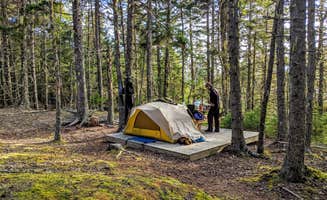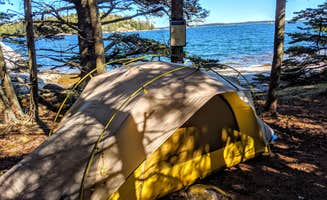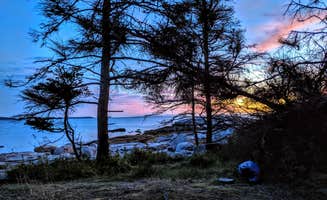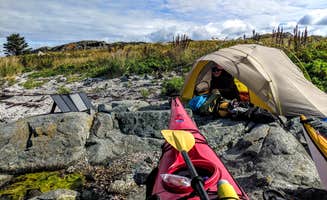Dispersed camping near Seal Cove, Maine requires nautical navigation skills and experience with tidal conditions. The Deer Isle Archipelago experiences temperature fluctuations between 45-75°F during peak summer season, with water temperatures rarely exceeding 60°F even in August. Marine weather patterns can shift quickly, creating challenging conditions for inexperienced boaters attempting to reach island campsites.
What to do
Explore nearby Acadia sections: Primitive camping opportunities around Seal Cove provide strategic bases for visiting lesser-known sections of Acadia National Park. From Wheat Island, visitors can paddle to Isle au Haut for day hikes without competing for the limited Duck Harbor campground reservations. According to one camper, "Perfect island for exploring the close-by Isle au Haut, a remote section of Acadia National Park, but very hard to get reservations at Duck Harbor Campground."
Beach combing: The shell-covered beaches around Doliver Island offer exceptional opportunities for finding unique marine specimens and sea glass. The small island serves as "a perfect launching spot for crossing Jericho Bay (4.5 miles) to Marshall Island the next day," with its "gorgeous shell covered beach and a beautiful view of Isle au Haut, just next door."
Resupply options: Despite the remote nature of primitive camping near Seal Cove, some islands offer strategic proximity to civilization when supplies run low. Marshall Island campers note that "if you happen to need a food or water resupply, Swan's Island is a short paddle away and has a very small grocery store and town office with fresh water."
What campers like
Protected landing zones: The technical challenges of sea kayaking to dispersed sites varies significantly between islands. Buckle Island receives praise as "a perfect island for those new to sea kayak camping as the sandy shore, which is exposed for a good portion of the day, is easy to land on and a short walk to a trail into the woods."
Insect-free options: While mosquitoes plague many islands in the Deer Isle Archipelago, certain campsites offer relief from biting insects. Visitors to Marshall Island report that "despite the fact that the other islands had pesky mosquitoes, this site had none," making it an exception in the region, particularly for evening comfort.
Conservation opportunities: Environmentally-conscious campers appreciate the chance to combine recreation with conservation. Several island sites encourage stewardship activities with tangible rewards, as one camper explains: "if you do a beach clean-up during your stay and send in a picture, you will receive a Maine Coast Heritage Trust hat!"
What you should know
Site capacity variations: The dispersed camping islands near Seal Cove offer dramatically different capacities. While some islands accommodate small groups, others provide barely enough space for minimal gear. Wheat Island features "2 sites– one very small one on the northeast side, the other perfect for larger groups on the southwest side," allowing campers to select based on group size.
Tide-dependent access: Landing conditions at many islands change dramatically with tide levels. Plan arrivals carefully, as some sites become nearly impossible to access at high tide. Experienced campers warn that Wheat Island "can be a tricky island to land on at high tide, so plan accordingly."
Seasonal insects: Mosquitoes remain problematic well into September, contrary to expectations. Campers report being surprised that "we thought we were passed mosquito season in early September, but alas, they were pretty bad at sunset," requiring appropriate preparation regardless of late-season timing.
Tips for camping with families
Beginner-friendly option: Families new to backcountry island camping should consider sites with easier landings and shorter carries. Experienced campers recommend Buckle Island for new paddlers because "the sandy shore, which is exposed for a good portion of the day, is easy to land on and a short walk to a trail into the woods."
Astronomy opportunities: Doliver Island provides exceptional stargazing for families with young astronomers, away from coastal light pollution. The open viewing angles over the water create unobstructed celestial views not available at mainland sites.
Shell collecting: Children particularly enjoy the beaches at Doliver Island, which feature extensive shell deposits perfect for young collectors. The "gorgeous shell covered beach" provides natural entertainment and educational opportunities about marine ecosystems.
Tips from RVers
Alternative accommodations: RV camping is not available on any of the dispersed islands near Seal Cove, as all sites require boat access. RVers seeking to experience these remote islands should consider commercial outfitters who offer day trips or guided overnight experiences with gear provided.





